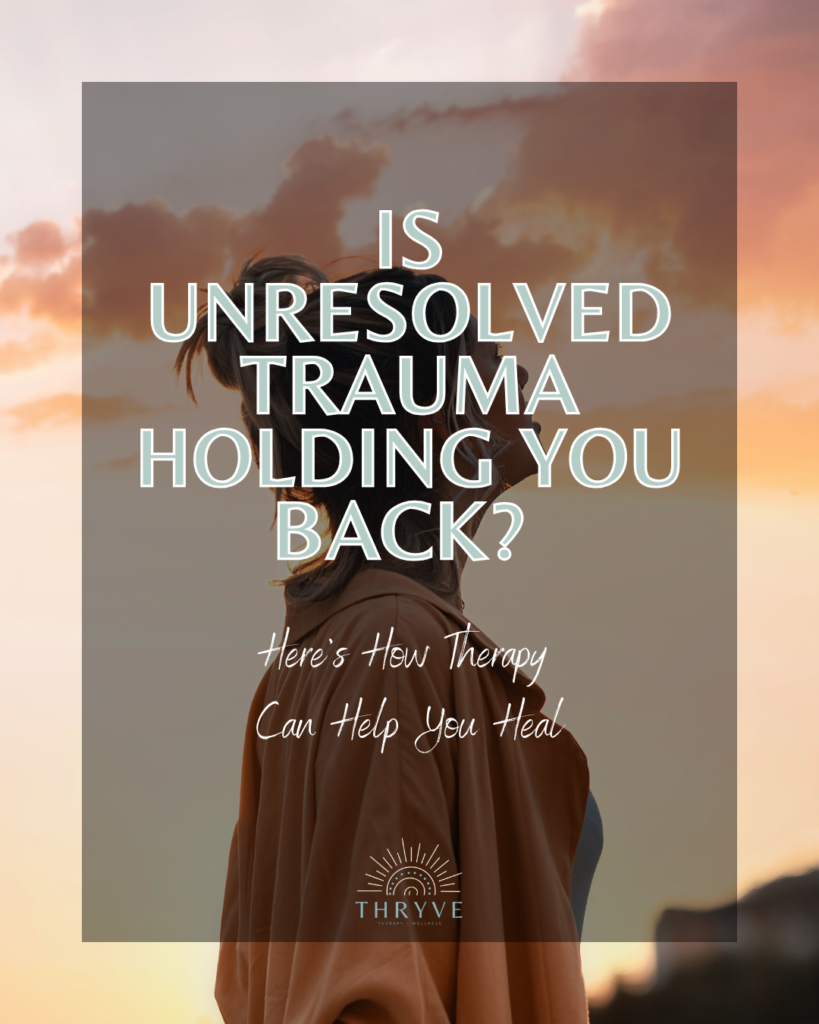Is unresolved trauma holding you back? Here’s how therapy can help you heal
Do you ever feel like something from your past still holds power over you? Maybe it’s not always on your mind, but it creeps up unexpectedly—in a conversation, a familiar place, or even during quiet moments. That old wound, the one you thought you’d moved on from, still lingers in the background, affecting how you feel and how you show up in your life.
Trauma doesn’t always look how we expect it to. You might not have the stereotypical flashbacks or nightmares, but that doesn’t mean it’s not there. Trauma can live in the body and mind in subtle ways, often unnoticed until it starts to impact your relationships, your work, or your overall sense of self. The truth is, unresolved trauma can have long-term effects that show up in ways we might not even realise.

What Is Trauma, Really?
Trauma isn’t just about experiencing something horrific. It’s anything that overwhelms your ability to cope. For some, trauma might come from a significant life event like abuse, a major accident, or a sudden loss. For others, it might stem from chronic stress, childhood neglect, or ongoing emotional pain that’s accumulated over time.
Studies published in the Journal of Traumatic Stress highlight that trauma can manifest in a range of emotional, psychological, and physical symptoms, from anxiety and depression to chronic stress and even physical illness (Van der Kolk, 2019). In fact, trauma can reshape the way your brain processes emotions, making it difficult to feel safe or connected—even years after the event.
The Long-Term Effects of Unresolved Trauma
You might think you’ve moved on from a painful experience, but unresolved trauma has a way of embedding itself into everyday life. Maybe you struggle with feeling constantly on edge, or perhaps you find it hard to trust others or let people get too close. You might notice recurring thoughts, fears, or emotional reactions that don’t seem to make sense in the present moment.
A recent study in The Lancet Psychiatry found that individuals who have not processed their trauma are more likely to experience mental health challenges such as depression, anxiety, and relationship difficulties years later (Bryant et al., 2020). The mind tries to protect you by avoiding painful memories, but in doing so, it can create emotional blocks that prevent healing.
Common signs of unresolved trauma include:
- Difficulty forming or maintaining relationships
- Persistent feelings of fear, guilt, or shame
- Emotional numbness or detachment
- Trouble focusing or making decisions
- Physical symptoms like headaches or muscle tension with no clear cause
Sound familiar? These long-term effects can feel isolating, but they’re actually very common. The good news is that trauma doesn’t have to dictate your future.
How Therapy Helps Heal Trauma
Healing trauma isn’t about ‘just getting over it.’ Trauma changes the way the brain works, but with the right therapeutic approach, it’s possible to rewire those responses and find relief. Therapy is a safe space where you can process the pain, uncover how it’s impacting your present, and learn healthier ways to cope with emotions.
According to research in the Journal of Clinical Psychology, trauma-focused therapies like somatic therapy and expressive arts therapy have shown significant success in helping individuals process traumatic memories and reduce symptoms (Shapiro & Laliotis, 2021). These therapies focus not just on talking about the trauma but also on how it lives in the body, helping to release the emotional and physical tension associated with past pain.
Through therapy, you can:
- Understand how trauma is affecting your thoughts, emotions, and body
- Process painful memories in a way that feels safe and manageable
- Reconnect with yourself and your body in a compassionate way
- Develop healthy coping strategies for dealing with triggers and stress
- Build resilience, self-compassion, and a stronger sense of identity beyond the trauma
Moving Beyond Survival Mode
If you’ve been living with unresolved trauma, it’s likely that you’ve been in “survival mode” for a long time—just trying to get through each day. But surviving isn’t the same as thriving. Therapy can help you move from simply getting by to truly living, by giving you the tools and support you need to heal from within.
As Trauma and Recovery expert Judith Herman explains, “Trauma robs the victim of a sense of power and control, but recovery offers the possibility of reclaiming both” (Herman, 2019). Therapy allows you to reclaim your power, step out of survival mode, and move forward in life with a renewed sense of peace and strength.
Is It Time to Start Your Healing Journey?
If you’re reading this and recognising yourself in these words, it’s possible that unresolved trauma is still affecting your life. But it doesn’t have to stay that way. Healing is possible, and it begins with taking that first step towards understanding and processing what you’ve been through.
You deserve to heal, not just survive. If you’re ready to move forward and take control of your life again, let’s start that journey together. Therapy provides a safe and compassionate space to work through your pain, rediscover your resilience, and find peace.
Book a consultation today and take the first step towards healing and reclaiming your life.
References:
- Bryant, R. A., et al. (2020). Unresolved trauma and the risk of future mental health issues. The Lancet Psychiatry, 7(4), 314-321.
- Herman, J. L. (2019). Trauma and Recovery: The Aftermath of Violence–From Domestic Abuse to Political Terror. Basic Books.
- Shapiro, F., & Laliotis, D. (2021). EMDR therapy and trauma-focused approaches in clinical practice. Journal of Clinical Psychology, 77(2), 247-263.
- Van der Kolk, B. (2019). The impact of trauma on the body and brain. Journal of Traumatic Stress, 32(2), 123-135.




